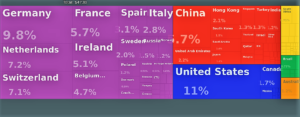‘Plague’ On sale now £9.99
Tags
Follow J.J.Anderson on Facebook
Follow J.J.Anderson on Pinterest
Archives
-
Recent Posts
Categories
http://www.thestorybazaar.com/rss.xml
Social
-
Privacy & Cookies: This site uses cookies. By continuing to use this website, you agree to their use.
To find out more, including how to control cookies, see here: Cookie Policy
A feast for the imagination


 RSS – Posts
RSS – Posts
Trade
Consistency is not something one associates with the President-Elect, but he has consistently espoused protectionist views. It’s why a lot of folk in the so-called ‘rust belt’ states voted for him, I suspect. Slap tariffs on cheap foreign imports and keep jobs in America.
Yet, protectionism, as experienced in the 1930s, ultimately damages the whole world, as trade slows and ceases. But it tends to damage the smaller countries more, their internal markets being insufficient to generate sustained economic growth. The U.S. may profit, with its huge internal market, at least at first, though ultimately everybody loses.
This is one of the reasons behind the post-war, 1944 Bretton Woods settlement and the creation of the international infrastructure which has governed world trade since that time.
The U.S.A. is Britain’s prime export market (as a single country) so any move to introduce tariffs on foreign goods will have a big impact on the UK economy. Bear in mind that UK goods may also be going to attract tariffs in Europe, depending on the terms of our exit, in our biggest overall export market.
Brexiteers have pointed to the help for exporters which a low-value pound brings, as the international currency markets have made plain their opinion about the economic future of the UK (value down 18%). There is that short-term benefit, even if, longer term, an increase in borrowing will be required to cover the shortfall caused by the drop in value. But even a low-value pound will not help exports if trade dries up.
As of 2015 the UK was the ninth largest exporter and the sixth largest importer in the world. The UK’s economy is already globalised. It is twentieth on the KOF Index of Globalisation* with France at nineteen and Germany at twenty seven. So which markets could we sell to that we don’t already? And who will be buying as protectionism kicks in and the world economy slows?
The ‘visualisations’ of the Observatory of Economic Complexity show, in neat fashion, who we currently sell to and who we buy from (see right and on the web-site). We export more to the U.S. than we import from it. Not so with some of our EU partners, which is a plus in any trade negotiations with the EU ( as set against our EU partners having good political reasons, pour discouragers les autres, not to give an exiting UK a positive deal ).
neat fashion, who we currently sell to and who we buy from (see right and on the web-site). We export more to the U.S. than we import from it. Not so with some of our EU partners, which is a plus in any trade negotiations with the EU ( as set against our EU partners having good political reasons, pour discouragers les autres, not to give an exiting UK a positive deal ).
An oft-repeated reason given why we should leave the EU was its ‘stifling beurocracy’, which was impeding our trading with the rest of the world and thereby restricting the UK economically. Negotiated EU-wide trade deals did prevent individual states going off and doing their own thing, it is true, but the argument was that the benefits would heavily out-weigh the disadvantages. After all, the same rules didn’t seem to hamper the economies of Germany, or even France.
This will now be tested in a rapidly worsening global climate. All the better for an independent UK, the Brexiteers trumpet, but that isn’t how economics works and the brighter among them must know that. Any protectionist moves by the U.S. will cause a slow-down in the world economy, reducing trade per se and making it more difficult for smaller entities to thrive. It’s at that point that one wants to be part of a bigger whole.
Very bad timing indeed.
There are some things which can be done. Currently, 75% of goods bought in the UK are made overseas. Folk of certain age will remember the ‘Buy British’ campaigns of the 1970s and there may be a return to that, so as to simulate internal economic activity.
There will also be some new foreign trade deals, but they will take time to negotiate and are unlikely to fill the shortfall in our balance of payments. N.B. The UK already borrows more, as a percentage of GDP, that it has ever done before in peacetime.
Ultimately, we’ll become less prosperous without trade and will have to find the money elsewhere. And that means more cuts.
By the way, I won’t, regular readers of this blog might be reassured to know, be venturing very often into the murky world of economics and I recognise that some of this is an over-simplification. Apologies to economists.
*N.B. KOF includes measures like international information and contacts and political globalisation as well as ‘pure’ economic data.
Share this:
Posted on 19th November 2016 by juliej Leave a comment
This entry was posted in Political comment and tagged Political comment. Bookmark the permalink.